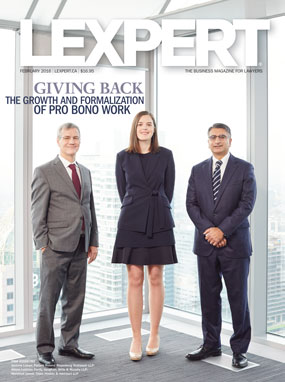Law firms are increasingly formalizing – and increasing – their pro bono work, from the grassroots to the Supreme Court of Canada
The concepts of “pro bono” and “cold calling,” especially when used in the same sentence, may seem incongruous. But for Alex Neve, Secretary General of Amnesty International Canada, there is a sort of harmony. In the last few years, he says, there’s more pro bono “on offer” than ever before; when there is a key case coming up before the Supreme Court of Canada that seems it would be of interest to the Ottawa-headquartered organization, Neve often gets approached by two or three lawyers and/or law firms.
Some of these firms may already have a well-established track record of representing Amnesty International, while others are cold calling. “They say, ‘the Supreme Court has an important refugee case coming up and there’s this really crucial legal issue that I would imagine Amnesty International is interested in and if you’re interested, we would certainly be delighted to be your pro bono counsel,’” he says.
Reflecting as to what’s driving this uptick in pro bono offers, although Neve says his opinion is totally impressionistic and anecdotal, “there’s no question that under the previous government it was very hard to make progress on some of the kinds of law reform and policy changes that human rights organizations and civil society groups felt were necessary, so increasingly the courts started to play a much more important strategic role for many of us than would have been the case previously.”
To some degree, that’s had a knock-on effect, says Neve, whose organization has intervened in areas as varied as indigenous land rights, refugee protection, national security, corporate accountability for human rights, the right to housing, and equality rights of First Nations children. “As more cases involving challenging and compelling human rights issues are coming up in front of the courts, they’re the kinds of issues that for lawyers are going to be meaningful and satisfying as pro bono work.”
Ongoing commitment, more questions
Running requests through a formalized committee is becoming more common at most large law firms for all types of pro bono work. At Osler, Hoskin & Harcourt LLP, says Mahmud Jamal in Toronto, Chair of the Pro Bono Committee, there’s a tradition of pro bono work that dates back more than a hundred years.
There’s no doubt that public interest pro bono work captures the nation’s headlines and transforms our legal landscape. For example, “think back to 1984 when the firm’s late Brian Morgan successfully undertook the Skapinker case, the first Charter case after the passing of the Charter of Rights and Freedoms to be heard by the Supreme Court,” he says.
But more often, pro bono at Osler is a grassroots initiative, driven by individual lawyers; these initiatives do not make the front pages. From the incorporation of the Girl Guides in 1917 or, more recently, helping to found Kids Help Phone, the firm looks to issues of importance in the communities in which it operates.
Jamal says the parameters of the firm’s pro bono work is set out in a formal policy, but flexible; means is a factor, but not determinative. In the overwhelming majority of cases – well over 90 per cent – the pro bono committee approves the request. “It really is very much a self-selection process, which is to say that we rely on lawyers to come to us with matters that they care about or where they have been approached,” says Jamal, noting that the firm’s pro bono work has increased 50 per cent over the past several years, in part because of the growing maturity of the firm’s offices outside Toronto, but also since there’s so much need.
Running requests through a formalized committee is de rigueur at most large law firms for all types of pro bono work; it can mean a longer process for approvals, especially on projects that look to be long term in nature. In the last two years, the Canadian Civil Liberties Association (CCLA) launched constitutional challenges as varied as Bill C-51, to the practice of solitary confinement in prisons, and to the provisions of the PIPEDA, which allow for third parties to provide personal information in certain circumstances to governments, says Sukanya Pillay, Executive Director and General Counsel at the CCLA in Toronto.
“It would be safe to say that in all of these cases, CCLA has been able to have a presence and a voice to advance and protect civil liberties precisely because of the assistance of pro bono counsel. We are a small organization, working to stay on top of civil liberties questions across the country; it is only through the contributions of pro bono counsel that we can actually have maximum impact,” she says.
Pillay says CCLA is also receiving more offers for pro bono assistance; as well, if the firm has some sort of alliance with CCLA, they remain committed and wanting to help. Increasingly, when individual lawyers call to ask how they can provide pro bono assistance on a particular issue, it’s much less ad hoc. “They ask more questions and look to their firm’s pro bono committee to green light their involvement, which they do almost 100 per cent of the time. The firms are cognizant of justifying resource expenditure; we understand this, it’s a sign of the times we live in,” she says.
In a new departure, in 2015 the CCLA, in its challenge of Bill C-51, dipped its toes for the first time into crowd funding. “This was a challenge we felt really strongly the public wanted us to do,” says Pillay. The goal was very modest, capped at $25,000 to help cover expenses and disbursements, which was reached in two days through social media. “The public relies on social media to get their news so, when presented with the option to do something, the response was great from Canadians who want to get involved,” she says.
More than public interest
At Borden Ladner Gervais LLP, the pro bono program and policies are not necessarily geared around public interest cases, so that is not the prime objective, according to Alexander De Zordo, a Montréal litigation partner and past chair of Pro Bono Québec. He says right from the very early days when David Scott put together the pro bono program at BLG, the firm’s National Pro Bono Committee focused on the individual, asking, “will this pro bono work benefit either an individual or group of individuals’ rights that wouldn’t have the opportunity to have those rights heard otherwise?”
With a keen eye on current issues, for example, BLG contacted the Office of the Veterans Ombudsman, and provides ongoing pro bono services to veterans across the nation who are unsuccessful before the Veterans Review and Appeal Board. The board allows veterans to seek judicial review of decisions before the Federal Court, and associated legal costs. The project’s overarching aim is to ensure that Canadian veterans and their families receive the disability benefits to which they are entitled under the law.
Learn more about the different long-term disability benefits in British Columbia here.
Such focus on underprivileged individuals means that much of the pro bono work undertaken by the various offices is very local; the Montréal office where De Zordo practises has an ongoing medical/legal partnership with the Dr. Gilles Julien Foundation, the forefather of social pediatrics that runs community clinics in Montréal’s marginalized neighborhoods. Families with legal needs are referred to the firm.
“This is often very one-on-one; it could be about access to schooling for special needs to slum housing issues, so it is individuals being directly affected by our intervention. These could turn into public-interest cases, but they are not taken on with that in mind. As such, we don’t measure return on investment since that is an unintended fortunate consequence of pro bono. Because we are privileged and have a monopoly on legal representation services before the courts, we feel that it’s of the utmost importance to give back to the community,” De Zordo says.
Global pro bono
In part, a prime task of the Pro Bono Committee is administrative, keeping track of requests. At Torys LLP, for example, says Susan Nickerson in Toronto, Co-chair of the committee, from Jan. 1 to Dec. 1, 2015 the firm undertook 154 pro bono matters, representing $2.7 million in legal services.
Nickerson, a partner in the firm’s Pensions and Employment Practice, says in addition to the ongoing public interest work the firm undertakes in pro bono cases, recently a significant focus has been assisting organizations affected by changing Canadian laws that govern not-for-profits. For example, federally regulated not-for-profits were required to continue from the Canada Corporations Act to the new Canada Not-for-profit Corporations Act or risk being dissolved by Industry Canada.
On a more international scale, Torys litigator Andrew Gray, Co-chair of the firm’s Pro Bono Committee, suggests that increasingly, if firms have an interest in being engaged globally in pro bono work, there’s opportunity for collaboration.
“I wouldn’t have necessarily thought of this type of work as pro bono before I got involved,” says Gray of the firm’s involvement in a number of international projects through TrustLaw, the Thomson Reuters Foundation for pro bono law (Thomson Reuters publishes Lexpert). This included an international project seeking legislative reform in China spearheaded by a UK law firm. Torys provided research on Canadian law on schemes to compensate and protect victims of crime in support of a Chinese women’s clinic. Says Gray, who practises in Toronto, “as a worldwide research project, the interesting part for us at Torys is that we were able to involve lawyers in Alberta, Ontario and Québec who all provided input from their respective jurisdictions.”
No expectation of payment
By its very nature, pro bono is done on the basis there’s no expectation of being paid. But Joseph Arvay, a partner with Farris, Vaughan, Wills & Murphy LLP in Vancouver, says an important way to encourage pro bono work is to recognize that in some cases counsel will be awarded their costs after the fact whether or not they are successful.
Currently, there’s much talk surrounding the future implications for funding of pro bono in light of the special costs awarded to the appellants by the Supreme Court of Canada (SCC) in Carter v. Canada (Attorney General). “I think we’ve established an important precedent in the Carter litigation, the so-called right-to-die case, in terms of having the court order special costs, or what’s called in some jurisdictions solicitor-client costs. And that was done on a full indemnity basis, so that was obviously very gratifying,” says Arvay, co-lead counsel, along with Alison Latimer of Farris and Sheila Tucker of DLA Piper, for the plaintiffs in the case.
But would this cost award influence lawyers to take on pro bono cases, such as the Carter case launched by the BC Civil Liberties Association (BCCLA), that would likely be incredibly complex and long?
Arvay says the lawyers acted pro bono going into the litigation and all the way through three levels of court, and were awarded costs only after succeeding in the SCC. He does view the special cost award in that case as one that would provide a real incentive to take on these types of cases but, he says, “there remains a real risk as you don’t know whether you’re going to get your costs until the end of the day and then, not necessarily, but often, only if you succeed.” He adds, “it’s not a great business model.”
Andrew Lokan, a Toronto-based constitutional litigator and partner with Paliare Roland Rosenberg Rothstein LLP, says the Carter cost award, “richly deserved for the amount of years and the amount of work they put in carrying that case, does seem to show a receptiveness at the highest court of the land to recognizing the role the pro bono lawyers bring in ensuring access to justice and integrity of the administration of justice.”
Having said that, adds Lokan, “we’ve had now a few years’ experience with advance costs orders and they remain few and far between, so it could be that Arvay’s case is not necessarily a one-off, but such special costs orders are likely to remain an unusual occurrence.” In fact, says Lokan, it’s only in exceptional cases that courts have been prepared to make advance costs orders, where a similar test is applied. For example, in Daniels v. Canada, a case affecting the constitutional status and rights of hundreds of thousands of Métis and non-status Indians, advance costs awards were made at all three court levels.
Lokan, who acted for the Congress of Aboriginal Peoples and three individual plaintiffs (together with Professor Joseph Magnet of the University of Ottawa), cites the importance of the issues in that case, and the number of people it affects, as factors in obtaining the advance costs orders. However, even with these orders, he says, counsel are typically paid only a fraction of normal rates. “Paliare Roland effectively subsidized that case to the tune of well over a million dollars over the 15 years that my colleagues and I were involved.”
Alison Latimer, reflecting on her role as co-counsel on the Carter case, says “deep pockets are required for complex constitutional cases and the truth is that most Charter claimants simply can’t afford the cost. But the cases are incredibly interesting and have the potential to effect meaningful social change.”
However, she says undertaking pro bono litigation even when it doesn’t proceed to trial can contribute significantly to effecting positive social change. In October 2014, Latimer filed a civil lawsuit against the province of British Columbia challenging the child support clawback provisions in the income assistance regime.
Working pro bono on behalf of a group of single mothers on social assistance and their children, Latimer says, “the law, which had devastating consequences for families in the province, provided that the amount of money an individual received on income assistance would be reduced by the amount of money that individual’s child received in child support from the other parent.” She says although the case never proceeded to trial, filing the lawsuit contributed to the public dialogue and likely contributed to the government abolishing the policy in 2015 without the need for a trial.
“I can’t think of a single area of law that does not include individuals who require pro bono assistance, from civil liberties, to poverty issues, family law, insolvency or criminal law matters,” says Latimer.
The next generation steps up
When Amnesty International’s Neve speaks of cold calls from lawyers, primarily these approaches are coming from younger lawyers. This may be reflective, and a consequence, of pro bono being increasingly highlighted in law schools, having Pro Bono Students Canada so present in law schools, and thereby encouraging a real commitment to the notion of pro bono right from the beginning.
As an example, consider Catherine Gleason-Mercier, now a third-year litigation associate with Osler, Hoskin & Harcourt LLP in Toronto, who last summer unexpectedly found herself facing a barrage of microphones and photographers. The global media glare was sparked by her co-representation of a group of international women soccer players who threatened to sue the Canadian Soccer Association and FIFA over their plan to have the women play on artificial turf rather than natural grass in the 2015 summer tournament to be held in Canada. The plan, said the women through Gleason-Mercier, amounted to gender discrimination under the Ontario Human Rights Code.
“We were always aware of not only the possible legal hurdles, but also the timing for the players to obtain any meaningful remedy because we became involved with less than a year to the tournament,” says Gleason-Mercier, who currently has two other pro bono matters before the courts that are not related to the FIFA matter. “We won a significant procedural dispute as the Ontario Human Rights Tribunal ruled in our favour that FIFA was properly served with the application and was obliged to respond. The players were able to use that leverage, as well as the fact that public opinion was on their side, to pressure FIFA in not using turf for future tournaments; the next Women’s World Cup in France in 2019 will be on grass.”
Gleason-Mercier’s involvement in the case came as the result of an existing relationship Osler has with a US firm on cross-border litigation billable matters. Reading through profiles of Osler’s litigation associates, they thought she would be a great fit due to her background as captain of a varsity soccer team. This speaks to the ongoing question of what lawyers should include in their profiles. “You can’t discount things that you think may be irrelevant because you never know what opportunities can come out of it. If I had left this out of my profile, I might not have ended up being the go-to person on what ended up being a fantastic pro bono file and an amazing experience for a junior lawyer,” she says.
New government, more support for pro bono?
With the change in federal government, many lawyers are waiting to see if Prime Minister Justin Trudeau will bring back the Court Challenges Program of Canada in some form and the effect it may have on public interest pro bono work. Arvay would certainly welcome back the program, which provided financial assistance for important court cases that advance language and equality rights guaranteed under Canada’s Constitution, although he hopes that any Court Challenges Program would now extend to litigation impacting all the rights and freedoms in the Charter.
However, although he concedes his viewpoint may be unpopular, he’d like to see the program structured in a way to help people start cases at the trial level because, he says, that’s where the funding is needed. “Truth be told, most lawyers are happy to do pro bono work in the SCC, or even at the appellate level, because these are great opportunities to do interesting and important work. Where there is a need for funding is for lawyers doing trial work in the trenches where these cases need to start as they are long and arduous and expensive.”
Expanding the number of lawyers who are able to do pro bono work is one of the aims of the Canadian Bar Association’s Pro Bono Committee, says committee member Patti Wheatley. “One of our priorities is to encourage law societies and their insurers to extend insurance coverage to a wider spectrum of lawyers, including in-house and government lawyers,” says Wheatley, a litigation associate with Stewart McKelvey in Charlottetown. As part of its mandate to encourage pro bono work, the CBA has called for each member of the legal profession to strive to contribute 50 hours or 3 per cent of billings per year on a pro bono basis.
As to how this expansion could have an impact on pro bono work, Wheatley says, “a large portion of lawyers in the country are uninsured because they are working in-house or for government.” The CBA Pro Bono Committee believes that encouraging more jurisdictions to expand coverage for pro bono work to this group would significantly enlarge the number of lawyers who can provide pro bono service.
Wheatley says Stewart McKelvey’s pro bono work is very much individually driven, with the emphasis on improving the quality of life in the Atlantic Region. Lawyers at Stewart McKelvey have undertaken a wide variety of pro bono work, such as assisting with immigration matters, providing wills to low-income members of the community and working with a plethora of non-profit community organizations, particularly in health and the arts.
Another idea for increasing the amount of pro bono work, suggests Rob Anderson, a litigator in Vancouver at Farris, Vaughan, Wills & Murphy LLP, would take a lot of commitment among various levels of government and law societies, and require a rethink of the tax system. If lawyers doing pro bono work could claim a tax deduction, he says, it might generate additional interest. He says there would need to be some real strictures to it; perhaps a set amount per hour on a sliding scale based on year of call, and capped at a percentage of income.
“I’m not suggesting for a nanosecond this wouldn’t require all kinds of political skills,” says Anderson. “But it does seem to me if the law societies and legal aid societies and public-interest organizations got together with a good tax lawyer and put a proposal to the Trudeau cabinet or Clark cabinet in BC, who knows?”
But for now, the reality is that the vast majority of pro bono work, whether it’s work that flies under the radar or is high profile, is funded internally. From his vantage point, says Lokan, speaking of public interest, “lawyers can always hope that they will get partial recompense through a cost award, but it remains just a hope except for the odd case that comes along. You go ahead and do this work because you believe in it; if you get an award it’s terrific because that might give you a little bit of leeway to do the next pro bono case.”





